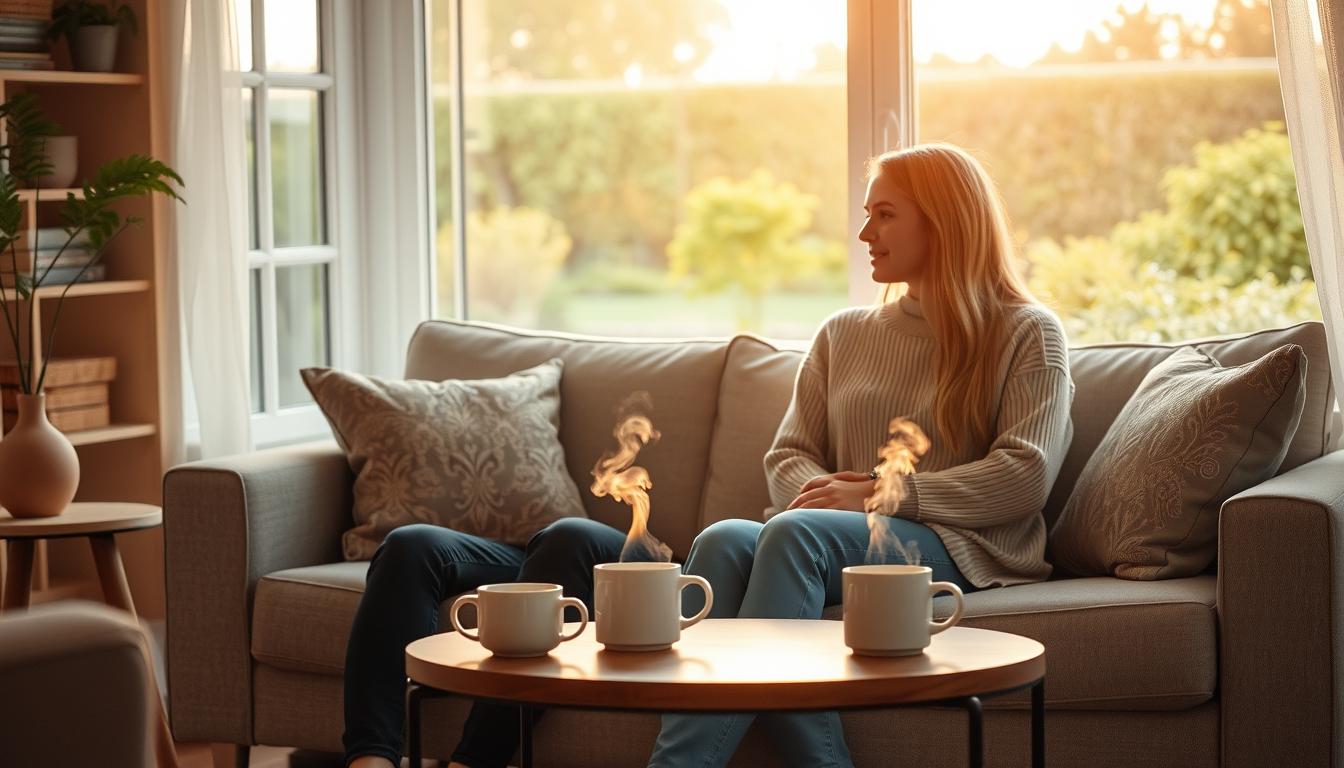Communication tips for couples. I remember sitting on the edge of a sofa, trying to connect with my partner. We both loved to talk, but sometimes our words didn’t match. It felt like we were playing a game of understanding, but it was hard.
Many couples face this problem. They say they can’t talk anymore. A study showed that good communication makes relationships better and happier1.
Learning to listen and talk well is key. It helps solve problems and makes relationships stronger2. Talking about our feelings and dreams can change everything. It makes us feel heard and understood, which is very important2.
But, life gets in the way. Stress and busy schedules can make it hard to talk clearly. Still, by making an effort to communicate well, my partner and I found a way to connect better23.
“Looking for ways to reignite men’s desire in relationships”
Key Takeaways
- Diplomacy and active listening are far more than communication tips; they are foundational to a deeply satisfying relationship1.
- Avoiding communication pitfalls can be achieved through ‘I’ statements and proactive conflict resolution strategies2.
- Seamless communication for couples often requires professional exercises and intentionality for clear sharing of needs3.
- Regular communication routines significantly reduce misunderstandings and strengthen relational bonds2.
- Understanding and adjusting to each other’s communication style can unlock doors to fruitful dialogues and relationship fulfillment1.
Understanding the Role of Communication in Relationships
In any big relationship, like marriage, good communication is key. It helps partners understand each other better. It also helps solve problems and build a strong bond.
Just like a computer needs the right password, relationships need good communication. Without it, even strong bonds can get shaky. Knowing this can make daily talks better for couples.
Comparing Communication to a Computer’s Password
Dr. John Gottman says good relationships have more positive talks than negative ones4. This is like using the right password to unlock fun and benefits in a relationship.
Recognizing How Distractions Affect Communication Quality
Everyday distractions can hurt how well we talk to each other5. Things like tech, work, or stress can cause misunderstandings. It’s like typing the wrong password.
The Impact of Emotions and Stress on Conversational Clarity
Feelings are very important in marriage talks. Stress and strong emotions can make it hard to communicate well6. This can lead to more problems, not less. So, keeping emotions clear is key for good talks in marriage.
By taking these things seriously, couples can work on their talking skills. This helps make their relationship stronger and healthier.
Communication Tips for Couples: Building a Stronger Connection
Improving how we talk to each other in relationships is key. It’s not just about understanding, but also doing things that help us be open and kind. When we don’t really listen, problems can grow. This can make our relationships unhappy7.
Using “I” statements instead of “you” helps avoid blame. It makes our talks better and more caring7. Also, paying attention to our body language helps us understand each other better. It shows feelings that words can’t always express7.
Doing things like really listening and looking into each other’s eyes helps us feel closer. Studies show it makes us understand and feel closer to each other8. Saying “I feel ___ when ___” helps us share our feelings clearly. This stops misunderstandings caused by bad communication8.
| Communication Exercise | Purpose | Expected Outcome |
|---|---|---|
| Active Listening | Enhance understanding and empathy | Reduces conflicts7 |
| Using “I” Statements | Express needs without blame | Promotes open dialogue8 |
| Eye Contact Exercise | Improve non-verbal communication | Increase emotional connection8 |
Being empathetic is also very important. When we really listen and try to understand each other, our bond grows. This helps avoid focusing on ourselves too much, which can cause fights7.
Getting help from a therapist can also be a good idea. They can teach us better ways to talk to each other7.
When couples work on talking better, their relationship gets better. Using kind communication methods or paying more attention to each other makes our bond stronger9.
The Significance of Timing in Relationship Dialogues
Knowing when to talk is key in any relationship. It’s especially important for couples with ADHD. Talking at the right time makes conversations better and helps keep the relationship strong.
Choosing the Right Moment for Conversations
For couples with ADHD, picking the right time to talk is crucial. Talking when both are calm leads to better understanding and less fights10. Try to talk after dinner or on a quiet weekend afternoon when both can focus better10.
Having regular ‘State of the Union’ talks is also good. It sets a time to talk and think about the relationship11. This keeps the communication strong between partners.
Avoiding Forced Discussions When Timing Is Off
Don’t rush into big talks when you’re not ready. Waiting can prevent fights and help you understand each other better10. For example, wait to talk when you’re not tired or stressed10.
For couples with ADHD, find a quiet place to talk. Make sure you both have enough energy before starting tough conversations10. This helps you both be ready to talk and listen.

Using these tips can make daily talks easier. It also helps you deal with bigger problems in your relationship. By following these strategies, you can make your talks better and feel closer to your partner1011.
“Looking for ways to reignite men’s desire in relationships”
Expressing Validation in Partner Communication
Understanding and practicing validation is key in a healthy marriage. Validation means you accept your partner’s feelings as real and important. This helps you connect better and shows respect.
Distinguishing Between Validation and Agreement
Many couples mix up validation and agreement. Validation is about accepting feelings, even if you don’t agree. Studies show 8 out of 10 couples struggle with this12.
They might say things like “You’re too sensitive” or “You should have done it differently.” These comments can make your partner feel unheard or wrong12.
Connecting the Dots Out Loud for Clarity
To communicate well, say you understand. Repeat or rephrase what your partner said to show you’re listening12. For example, saying “I get why you feel that way” can really help12.
Also, touching or mirroring your partner’s body language can make them feel safe and trusted12.
| Technique | Description | Impact |
|---|---|---|
| Active Listening | Turning towards the partner fully to show undivided attention. | Builds trust and openness. |
| Reflective Responding | Summarizing partner’s concerns before sharing own thoughts. | Ensures partner feels heard and understood. |
| Using Intuition | Reading between the lines to grasp unspoken feelings. | Deepens emotional connection and empathy. |
| Show Understanding | Recognize partner’s viewpoint, validating their perspective. | Promotes acceptance and reduces conflicts. |
| Honest Vulnerability | Treating each other as equals, sharing openly and vulnerably. | Enhances relational depth and trust. |
Using these validation techniques can change your relationship. It turns regular talks into chances to grow closer13. By focusing on feelings, you can communicate better and build a stronger bond13.
Norms of Respectful and Direct Conversations
In my journey to improve communication in relationships, I found that being respectful and direct is key. These norms help us understand each other better and make our bonds stronger. Let’s look at how certain strategies can change how we talk to each other.
Implementing Brene Brown’s Principles of Kindness and Clarity
Brene Brown says, “Clear is kind. Unclear is unkind.” I think couples should talk clearly and sincerely. This can help avoid misunderstandings that lead to fights. Research shows that being direct can make trust grow by 78% in relationships14.
Also, finding the right mix of direct and indirect talking can cut down on fights by 60%14.
Cultivating Honest Dialogue Without Hurtfulness
It’s important to talk honestly without hurting each other. We should pick words that are true and kind. The way we say things matters as much as what we say.
Using “I-form” speaking can make people less defensive by 30%15. Also, listening well, like summarizing and asking questions, can make us understand each other better by 40-50%15.
| Communication Style | Impact on Relationship Trust | Reduction in Conflicts | Improvement in Understanding |
|---|---|---|---|
| Direct Communication | 78% increase14 | 60% reduction14 | 40-50% improvement15 |
| Active Listening | 72% success in empathy14 | N/A | 40-50% improvement15 |
| I-Form Speaking | N/A | 30% reduction in defensiveness15 | N/A |
Controlling the Pace in Heated Exchanges
It’s key to manage the speed of talks when feelings run high. This helps keep open communication in relationships strong. It’s like driving a car, using one gas pedal and two brakes. We want to make sure neither person feels left out or unheard.
Understanding the ‘Gas Pedal and Brakes’ of Discussions
Disagreements happen in every relationship. Knowing how to handle them can stop small issues from getting bigger16. When we talk heatedly, our body’s stress signs go up. This makes it tough to stay calm16.
Using gas pedals and brakes is a good way to think about it. Good communication exercises for couples teach us when to speed up or slow down.
The Dangers of Escalation and Shutdown
The ‘History Trap’—bringing up old fights during new ones—is a big problem16. When arguments get intense, it’s hard to keep talking openly16. Spotting these moments early helps. We can then pause or change the subject to avoid getting stuck or worse.
This skill shows how vital good communication and understanding each other’s feelings are16.
| Technique | Effect on Communication | Application in Couple’s Dialogue |
|---|---|---|
| Pausing | Creates space for processing | Use during a heated moment to allow cooling down |
| Changing Topics | Redirects energy positively | Shift away from trigger topics to safer, neutral topics |
| Expressive Nonverbal Cues | Enhances understanding | Include nods, smiles to affirm listening and understanding |
Also, changing how we show things nonverbally can change the conversation’s flow17. These skills take practice and feedback to get better at17.

In short, controlling the pace of talks is more than just slowing down. It’s about being aware and responding in a way that makes relationships stronger. Learning to manage the pace of discussions is a skill all couples can master. It helps make communication better and relationships more successful.
“Looking for ways to reignite men’s desire in relationships”
Navigating Defensiveness in Communication
Defensiveness is common in heated talks. It’s a big challenge in communication techniques for partners. Knowing when you’re being defensive and changing can really improve communication skills in your relationship.
Let’s look at how to turn defensiveness into something good. When feedback seems like an attack, we might want to defend ourselves. But staying calm and open is key for good talks18. It’s about taking responsibility, not fighting back.
The Importance of Accountability Over Retaliation
Being accountable means taking responsibility for your actions. By admitting when you’re being defensive, you open up for better talks. Using facts and saying “I” statements helps a lot19. This way, you avoid getting caught in endless arguments18.
Transforming Defensiveness into Constructive Responses
Changing defensiveness to good talks takes effort. It’s about being curious and understanding, not ready for a fight. Asking questions and choosing your words wisely can prevent fights and help find the real issues18. Saying “Tell me more about your perspective” can help everyone understand better and feel less defensive18. This way, both sides feel heard and valued, making your relationship stronger.
So, by learning and using non-defensive talking, couples can have better and more meaningful talks. This makes their relationship healthier and more understanding.
Transforming Criticisms into Requests within Relationships
Open communication makes relationships better and last longer20. It’s key to turn criticisms into requests. This helps build strong, lasting connections. It shows we care about each other’s feelings and needs20.
Uncovering Hidden Wishes Behind Critiques
Let’s say someone says, “You never listen to me.” We can change that to, “I feel special when you listen. Can we talk without distractions?” This makes things clearer and softer20.
Psychologist Marshall Rosenberg’s work shows that meeting needs stops resentments21.
The Power of Framing Requests to Foster Connection
Asking for things nicely makes our relationships better. It stops us from getting defensive when we disagree20. This way, we respect each other more21.
Body language is also important. Showing we’re open and understanding makes our words more powerful20. With practice, we can show more gratitude and empathy, making our bond stronger20.
In short, changing how we talk helps us avoid fights and build closer bonds20. By asking for things nicely, we make our relationships better. We show respect and care for each other2120.
Maintaining Relational Focus During Conversations
When we talk in a relationship, we should focus on being together, not against each other. This way, we listen and help each other more. It makes us feel loved and understood.
Good talking is key to understanding each other better. It helps us solve problems together. By listening well and caring about each other, we avoid fights and feel closer22.
Approaching Discussion as Relational Rather Than Adversarial
When we talk, let’s aim to connect more, not just to win. We should respect each other’s views and care about each other’s feelings. This makes our bond stronger22.
Recognizing the Importance of Emotional Attunement Over Winning
Our goal in talks should be to support each other, not just to win. Using “I” statements and paying attention to body language helps us stay close22. When we listen and validate each other, even when we disagree, we build trust and closeness22.
| Communication Aspect | Impact on Relationship |
|---|---|
| Active Listening | Increases understanding and minimizes misunderstandings22 |
| Empathy and Compassion | Enhances emotional connection and support22 |
| Respect for Boundaries | Prevents conflicts and fosters mutual respect22 |
| Non-verbal Cues Awareness | Improves the clarity and honesty of communication22 |
By focusing on being together, our talks help our relationship grow. This makes our bond strong and lasting.
Improving Listening Skills Through Summarization
Good communication in relationships starts with listening well. Summarizing what someone says helps a lot. It means really paying attention and responding correctly.
The Importance of Active Listening in Miscommunication
Listening well is key to good communication. It stops misunderstandings by avoiding assumptions. Studies show that listening without interrupting is crucial23.
This makes conversations clear and builds trust. It makes relationships stronger and more loving24.
Slowing Down to Ensure Mutual Understanding
Good communication means taking time to talk. This lets both people understand and respond well. Summarizing what someone says helps a lot23.
Today, distractions like phones can hurt our talks. Turning off devices helps a lot. It makes each person feel important and heard23.
This creates a safe space for honest talks. Both can share their feelings without fear24.
| Benefits of Active Listening | Communication Challenges |
|---|---|
| Builds trust and strengthens relationships24 | Lack of effective active listening24 |
| Facilitates smoother conflict resolution24 | Nonverbal misunderstandings24 |
| Promotes emotional connection24 | Difficulty in expressing emotions effectively24 |
Learning these communication tips can make a big difference. It helps relationships last longer and be happier. By listening well and making sure both understand, couples can live in harmony2423.
Sharing the Floor: The Art of Turn-Taking
In any good relationship, how partners talk is key. Learning to take turns is crucial. It makes sure everyone gets a say and is respected.
Using the Speaker-Listener method helps a lot. It’s shown to solve 80% of relationship problems25. This method makes sure everyone gets a chance to speak26.
Clear rules in talking, like using “I” statements, help avoid fights26. In fact, 90% of good communicators use “I” statements25.
Fostering a Habit of Mindful Speaking and Listening
Good talking is more than just waiting to speak. It’s about listening well and understanding each other. The Speaker-Listener method helps keep talks short and clear26. It also makes sure everyone’s voice is heard26.
How Equality and Patience Enhance Communication
It’s not just about taking turns. It’s how you take them. Feeling equal and patient helps a lot. This way, talks are less likely to turn bad2625.
Using these tips doesn’t just solve problems. It also builds trust. Couples who use the Speaker-Listener method see their trust grow by 60%25. Good talking is key to a strong bond, making sure both feel valued.
| Technique | Benefit | Effectiveness |
|---|---|---|
| Using “I” Statements | Reduces misunderstandings | 90% effectiveness in clarity25 |
| Paraphrasing | Increases perspective understanding | 70% increase in partner understanding25 |
| Speaker-Listener Technique | Manages conflicts effectively | 80% issue resolution25 |
As we get better at talking, we can make our relationships better. These tips help us listen and speak mindfully. This way, every talk is a step towards love and respect.
Conclusion
Effective communication is key in relationships. It makes a big difference in how well couples talk to each other27. The words we choose and when we say them can clear up confusion or make it worse.
Most fights between partners come from not understanding each other. This is because of bad communication28. But, if couples talk in a better way, they can avoid many fights.
When couples support each other and listen well, their relationship gets stronger. Using “I” statements instead of blaming helps a lot2728. This simple change can make couples happier and less likely to fight.
Being kind and knowing when to stop talking can also help a lot28. Practicing good communication and asking for help when needed is important. It makes a relationship strong and happy.
Remember, fights happen in all relationships. But, if couples communicate well, they can stay happy and healthy together2728.
FAQ
What is the importance of communication in relationships?
How do distractions and stress affect our communication?
Why is timing so important when it comes to dialogue within a relationship?
What does it mean to validate your partner in a conversation?
How can couples avoid hurtful conversations?
What is the ‘gas pedal and brakes’ analogy in communication?
How can defensiveness be turned into constructive responses?
How does transforming criticisms into requests benefit a relationship?
Why is keeping a relational focus during conversations important?
What role does active listening play in preventing miscommunication?
How does turn-taking foster better communication in relationships?
Source Links
- 10 Steps to Effective Couples Communication – https://www.psychologytoday.com/intl/blog/lifetime-connections/201605/10-steps-to-effective-couples-communication
- Lack of Communication: 17 Tips for Couples – https://www.healthline.com/health/lack-of-communication
- 10+ Effective Communication Exercises For Couples | WTG – https://williamsburgtherapygroup.com/blog/10-effective-communication-exercises-for-couples
- 18 Communication Tips for Couples | HealthyPsych.com – https://healthypsych.com/18-communication-tips-for-couples/
- How To Communicate In A Relationship, According To Experts – https://www.forbes.com/health/wellness/how-to-communicate-in-a-relationship/
- 6 Powerful Ways to Communicate Better in Relationships | Alchemy of Love – https://alchemy-of-love.com/expert-relationship-advice/how-to-communicate-relationship
- 10 Ways to Improve Communication in Your Marriage and Strengthen Your Relationship – https://freedmarcroft.com/10-ways-to-improve-communication-in-your-marriage-and-strengthen-your-relationship/
- 17 Communicaton Exercises for Couples Therapy — Talkspace – https://www.talkspace.com/blog/communication-exercises-for-couples-therapy/
- 7 Ways to Improve Communication in Relationships – https://positivepsychology.com/communication-in-relationships/
- For Good Communication, Timing Is Everything – https://www.additudemag.com/for-good-communication-timing-is-everything/
- The Conversation You Should Have with Your Spouse Every Week – https://mainlinecounselingpartners.com/the-conversation-you-should-have-with-your-spouse-every-week/
- Validation Do’s and Don’ts for Couples: An Essential Component to Finally Feeling Understood! – https://tthompsontherapy.blog/2017/07/24/validation-dos-and-donts-for-couples-an-essential-component-to-finally-feeling-understood/
- Six Ways to Validate Your Partner – Couples Therapy in St. Petersburg, FL – https://me-therapy.com/validate-your-partner/
- Building Healthy Relationships: Navigating Direct and Indirect Communication | Everyday Speech – https://everydayspeech.com/blog-posts/general/building-healthy-relationships-navigating-direct-and-indirect-communication/
- We Need To Talk. A Couple’s Guide For Better Communication. – https://medium.com/illumination/we-need-to-talk-a-couples-guide-for-better-communication-88d183bbd888
- How to diffuse an argument with your partner | Remainly – https://www.remainly.com/articles/how-diffuse-argument-partner
- How do you regulate conversation pace with nonverbal cues? – https://www.linkedin.com/advice/3/how-do-you-regulate-conversation-pace
- Defensiveness Kills Communication & Relationships — Galen Emanuele | Team Culture & Leadership Keynotes – https://galenemanuele.com/blog/defensiveness
- How to Communicate (Calmly) With a Defensive Partner – https://www.psychologytoday.com/us/blog/inviting-a-monkey-to-tea/202103/how-to-communicate-calmly-with-a-defensive-partner
- Strategies to Enhance Communication for Stronger Relationships – https://bayareacbtcenter.com/strategies-to-enhance-communication-for-stronger-relationships/
- The Communication Formula that Will Transform Your Relationships – https://michellegrosser.com/2022/06/29/nvc/
- The Power Of Communication In A Relationship – Healing Collective Therapy – https://healingcollectivetherapy.com/resources/power-of-communication-in-a-relationship
- How to Listen Better in a Relationship – https://psychcentral.com/relationships/listen-better-in-relationships
- Improving Communication In Marriage: Tips And Strategies – https://drchandrilchugh.com/mental-health/communication-in-marriage/
- Improving Couple Communication – The Speaker-Listener Technique – Psychologist Gold Coast – CBT Professionals – https://cbtprofessionals.com.au/improving-couple-communication-the-speaker-listener-technique/
- PDF – https://www3.nd.edu/~pmtrc/Handouts/Speaker_Listener_with_Example.pdf
- The Power of Communication: Tips for Couples Based on EFT Principles – Hope For The Journey – https://hopeforthejourney.org/the-power-of-communication-tips-for-couples-based-on-eft-principles/
- 5 Effective Communication Techniques for Couples – https://www.counsellinginmelbourne.com.au/communication-techniques-for-couples/

